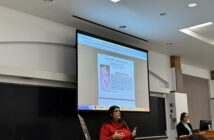When Peter Luba was a senior at a public high school outside of Philadelphia, Pennsylvania, he and his classmate Dhruv Sringari were approached by their assistant principal during a coding class.
He proposed the idea of a digital hall pass to the pair, one that would allow teachers to keep track of students throughout the day and give administration insight into student behaviors. Luba and Sringari launched the app, SmartPass, at their high school that same year before leaving for Lehigh and Penn State respectively.
While at Lehigh, Luba majored in Integrated Business and Engineering, and was active in the Lehigh Consulting Group and Residence Council. However, he said the accomplishment he was most proud of while at Lehigh was starting The Lehigh Lookaway, a popular satire publication, with his two best friends.
Balancing coursework and extracurricular activities, he continued to work on SmartPass alongside his co-founder.
By the end of his first year at Lehigh, Luba said SmartPass was being used in about 10 schools. Just over a year after he graduated a semester early in December 2021, it had been implemented in over 1,000 schools and only continued to grow. Luba quit his job at Salesforce and became SmartPass’s full-time CEO.
This November, at 24 and 23 years old, Luba and Sringari were selected for the 2023 Forbes 30 Under 30 list in the education category.
Q: What kind of impact do you want SmartPass to have on the schools that use it?
PL: Ultimately, we’re trying to make school staff and principals’ lives easier. A handful of the goals of SmartPass are to bring more technology into the school building that actually helps the teachers and staff members and doesn’t hinder them, and ultimately just drives better student outcomes. We’re doing that through maximizing their time in class and maximizing their instructional time. If you have an early indicator that a student is missing three hours a day of classes, even if their attendance record is showing that they’re attending class, then (the school can) have a conversation with that student.
Q: How did your time at Lehigh prepare you for your current trajectory?
PL: I think the coolest thing was even when I was just hacking away in my dorm room or in FML, or just being in some marketing or computer science class, I knew I could implement the little techniques I learned about. Hands-on learning is one of the most effective ways to learn. I always think about something through a SmartPass lens, so I’d think “Oh, this marketing tactic, I can do something like this with SmartPass,” and it really helped me grasp onto that actual theory and apply it right there.
Q: How do you think your age as a younger entrepreneur in the education technology world has hindered or helped your success with SmartPass?
PL: I think with entrepreneurship in general, I’ve read a decent amount about this but, going into an industry where you almost don’t know as much is actually such a skillset because you come at it with such a fresh perspective and you go to “first principles” and you don’t even know necessarily what to be scared of. So you’ll go and do this crazy thing that maybe someone with ten years of experience wouldn’t even think to touch. But because you’re such an open mind you’ll be like “Oh ok, this can’t be that bad.” Then we’ll go and try it and we’ll do it some of the time because we found some creative way or we found these five people who gave us these tidbits of advice. We try to use that as as much of a resource as possible, and then when it’s not a resource we very are very quick to admit “Ok, this is not something we’ve done before, let’s go bring someone in who has done this before.”
Q: As CEO, when building the SmartPass team, are you hiring people who are mostly older than you? What is it like to be the youngest in the room?
PL: Oh 100%, I think we just brought on someone who’s younger than us, but for a while we were the youngest people. I think it boils down to everyone having such an interesting perspective. We have former teachers on our team, some that have actually been on teams that use SmartPass and then transitioned into the (education technology) world. For the most part, we are the closest people to what was a student in a classroom which is such a unique perspective, (and we have) a different product point of view than our head of sales and our sales director. Both of them have absolutely so much experience on how to make sure the sales team has as effective, efficient and lively goals as possible, and that’s something we have zero experience in. I think overall, it means a great learning perspective and everyone in the team is very much encouraged to learn from each other because everyone has different pockets and assets. Asking questions is the most important thing.
Q: How did it feel to be named to the Forbes 30 under 30 list?
PL: It was really cool because we found out on the exact same day the entire world found out. We woke up with an email and were like “Oh my gosh this is amazing,”… It was such an honor to be amongst all the other talented people and see everyone else’s contributions. It is totally motivating in and of itself. It’s important to mention that our work doesn’t end here. It’s onwards and upwards because there’s so much impact to serve.
Q: In their write-up, Forbes references SmartPass ‘bootstrapping’ until it received financial backup. What was it like transitioning from just you and your co-founder to being backed by large funding?
PL: When we were building SmartPass all throughout college, we never thought it was going to be some big company or anything like that. We joined other companies and had full-time jobs and were just doing SmartPass as a side project. And really when, post-COVID, schools started sharing it amongst themselves and realized this tool really helps, it definitely switched to be this can be something so big. Not just something that 50 schools use, but that almost every school across the country has the ability to experience these benefits because they all have these similar issues that SmartPass does a really good job of solving. So our decision to go down that path and raise money, build out a really big team, expand into more products just beyond the hall pass space, was just us realizing that we are in such a good position to do this. We think our product is one of the best in the space that can help serve all these schools and we feel like we can make a really good impact in K-12 education.
Q: What would you say to students or young people in general who have a project that they are interested in pursuing?
PL: It’s easier than ever before for literally anyone to start something. We started this when we were seniors in high school six years ago and, even six years ago, it was really challenging but we started small and started with what we knew and just did it. Given the amazing resources that Lehigh provides, that the internet provides, even just free education credits and stuff like that, people don’t necessarily have to start by saying “I want to start a company.” Just take one problem that you’re either really aware of or you have yourself and just build a little tool that helps solve that problem. And once you do that, just start slowly expanding it and expanding it and eventually you’ll feel when you have something that people want because customers will start banging on your door. Anyone can do it if you have the will to just do it.
Q: If Forbes were to have a 40 under 40 list, what would you want to be nominated for? Do you see yourself continuing with SmartPass in the next 10 years or do you plan to branch out into new avenues and projects?
PL: I’m not much of a person for five-, 10-, 15-year plans. I’m very much a “What am I doing in the next week,” guy. So I am not quite sure. But over the next couple of years at least, we’re trying to make as much as an impact in the K-12 and the tech space as possible with SmartPass. We’re having a really awesome time with SmartPass and it’s really just the beginning of it.






Comment policy
Comments posted to The Brown and White website are reviewed by a moderator before being approved. Incendiary speech or harassing language, including comments targeted at individuals, may be deemed unacceptable and not published. Spam and other soliciting will also be declined.
The Brown and White also reserves the right to not publish entirely anonymous comments.